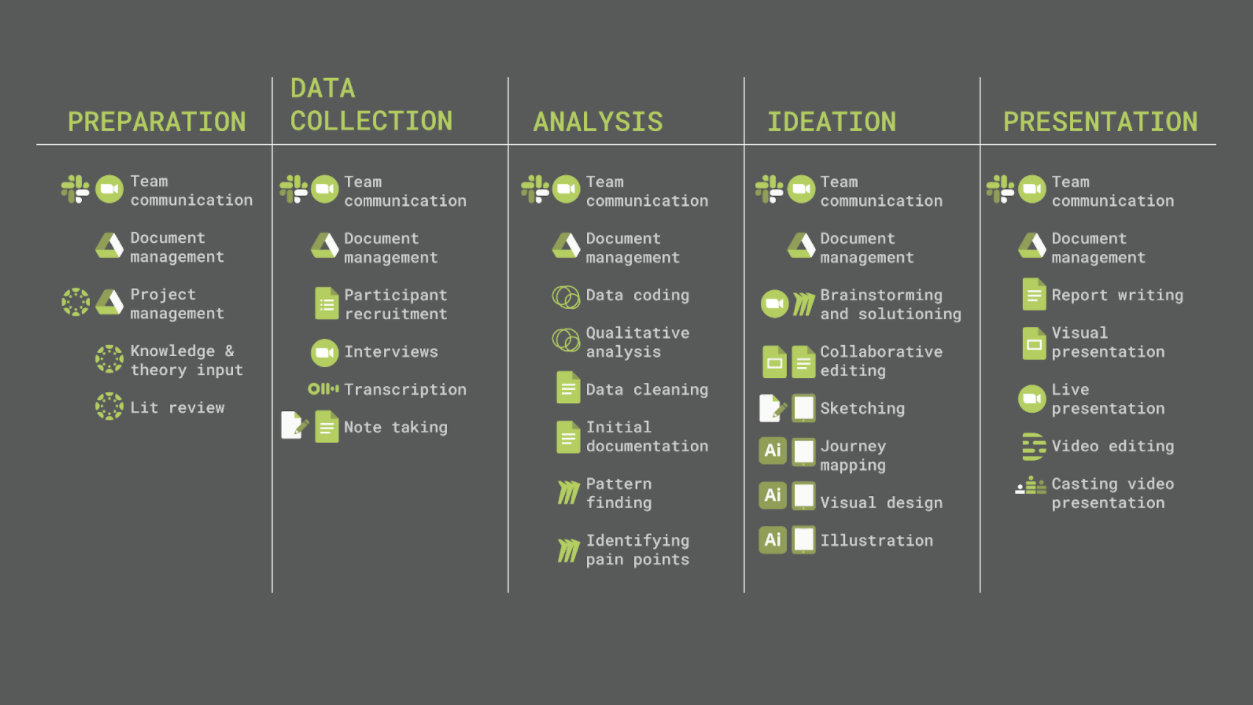
Reflections on Video Games, Virtual Communication, and Our Pandemic Lives
Published in the Spring 2022 issue of the Journal of Business Anthropology | May 5, 2022
Authors: Sally Darling and Jessica Keller
Abstract:
Remote work and social isolation required by the Covid-19 pandemic increased the need for communication technology that allows collaboration in business and social contexts. This essay is our reflection on research on communication technology used by online gamers and the impact the research had on our personal and work lives as we adapted to the conditions of the last two years of pandemic living.
Communicating Across the Gap: Online Gaming, Communication, and Community
Presented at the 2022 Annual Meeting of the Society for Applied Anthropology | March 22 - 26, 2022
Awarded 1st Place in the Student Video Poster category!
Authors: Ben Clark, Sally Darling, Jessica Keller, Arooj Qureshi, Lisa Stocker, Jingwen Wang
Presentation Abstract:
Online gamers use technology for collaboration, knowledge sharing, and building communities and culture with fellow gamers. Our research indicates that sharing aspects of personal identity online can help build stronger communities, but engaging in a more extensive online social sphere increases individual gamers’ vulnerability to marginalization, racism, sexism, and other toxic behavior. This study highlights how an approach located at the intersection of design anthropology and anthropology of technology can support designers of inclusive and safe virtual spaces by helping them reflect deeply on user identity and communication in the context of online social worlds.
Communicating Across the Gap: Gaming Consoles and Community
Presented at the IUAES Yucatan Congress 2021 | November 9, 2021
Panel: The Kinship Between Anthropology and Technology: Exploring the Accelerated Interface between the Two
Authors: Ben Clark, Sally Darling, Jessica Keller, Arooj Qureshi, Lisa Stocker, Jingwen Wang
Presentation Abstract:
For multiplayer online gamers, communication and technology are deeply intertwined. Gamers use technology for collaboration, knowledge sharing, and building communities and culture with fellow gamers. Our research sought to understand the communication practices of gamers who use technology outside of their console (PlayStation/Xbox/Switch) to communicate with friends or teams. This study highlights how an approach located at the intersection of design anthropology and anthropology of technology can support design teams as they develop tools for inclusive and safe virtual spaces by helping them reflect deeply on user identity and context.
In Spring 2021, as part of a design anthropology course at the University of North Texas, we conducted virtual ethnographic research on gaming communication for Diana Hubbard, Group Design Manager at Blizzard Entertainment. Study participants were observed during gaming sessions and interviewed about their gaming practices, attitudes, and use of technology. Qualitative analysis revealed that a sense of community and a desire to feel safe are critical to an enjoyable gaming experience for console gamers. Findings from our research indicate that sharing aspects of personal identity online can help build stronger communities. However, engaging in a larger online social sphere also increases individual gamers’ vulnerability to marginalization, racism, sexism, and other toxic behavior. To mitigate these barriers to safe online communities, participants customized and combined existing technology, often using several devices or platforms simultaneously to communicate with – or exclude – various gamers.
The communication strategies used by our participants may point to possible solutions for limiting exposure to online toxicity and lessening the impacts of marginalization. Designers can develop ways to address the limitations of existing communication tools by examining these strategies, especially ones which allow users to self-identify according to personal preference or create different social circles based on levels of interpersonal trust. The findings of this study illustrate how design anthropology can utilize ethnographic and qualitative methods to assist in developing communication technology in online social spaces. Studying the uses and limitations of technology to understand communication practices and cultural mores is vital to our work as anthropologists working in digital spaces. By studying design and technology through an anthropological lens, we captured how gamers manipulate technology to construct and control their own online communities and identities.
Skills that anthropologists and designers brought to this research project. Shared skills are shown in white text, anthropological skills are shown in blue text, and design skills are shown in green text.
Tools utilized for our interdisciplinary remote collaboration between anthropologists and designers
From Toxicity to Dignity: Gamers as Designers of Social Worlds
Presented at Big Design 2021 | October 6, 2021
Authors: Ben Clark, Sally Darling, Jessica Keller, Lisa Stocker, Jingwen Wang
Supported by Dr. Christina Wasson
Panel Abstract:
Toxicity is so widespread in our online communities, it is hard to imagine a future without it. Multiplayer gaming is no different, but our research points to a solution: gamers are designers!
For the love of the game and for self-preservation, many gamers bypass existing tools and instead stitch together the safe spaces and friendly online communities they need. Utilizing a jumble of communication tools, gamers choose when to hide or reveal layers of their personal identities based on comfort level.
Gamers are already designing systems with flexible, activity-based self-representation as a route to safer online communication - as designers and researchers, we can look to them for solutions to toxicity management in online spaces.


